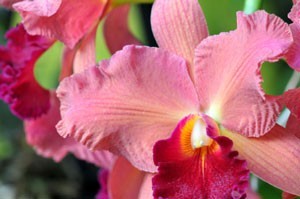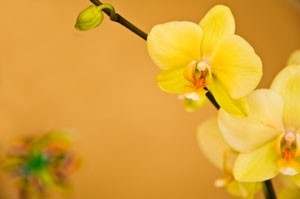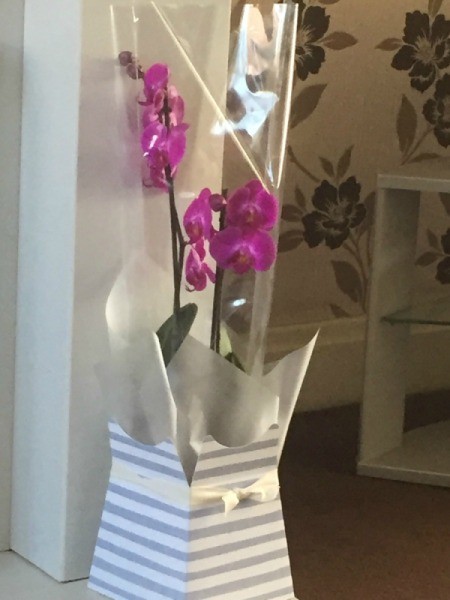
Auntie Sandi from Montreal, Quebec
What a wonderful gift! It sounds beautiful, too! The first thing I would recommend is finding out what type of orchid you have. If your orchid did not come with a plant label, use the resources below or ask the person who presented it to you where they bought it. If it was purchased at a nursery, contact the nursery for help in identifying it. Identification is important because different types of orchids sometimes have very different growing requirements. In any case, here are some general rules to follow:
Temperature: This is where the needs of some orchids really differ. As a rule, try to keep daytime temperatures around 70F in the summer and 60F in the winter. Cool nights are important for most orchids, so a drop in nighttime temperatures of approximately 10F is ideal. Always avoid cold drafts and sudden swings in temperature.
Light: Lots of bright (not direct!) sunlight is important. Orchids need 10-15 hours of light each day so plan to support them with some artificial lighting in the winter if necessary.
Humidity: Set you orchid's pot on a pebble tray filled with water and locate it in an area with good ventilation. It is fine to set your orchid outside in the summer on warm days, just make sure you protect it from direct sunlight.
Watering: As with most houseplants, orchids need consistently moist (not wet) compost. Filtered water is best (not distilled). Reduce the frequency of watering in the winter when light quality is lower. It is okay to let the top 1-inch of soil dry out between watering, but never let the pot dry out completely.
Feeding: There are several fertilizers formulated for orchids. Read and follow label directions carefully. Drastically reduce or eliminate feeding entirely during the winter.
Repotting: Orchids prefer to be somewhat pot-bound, so repot only every 3-4 years or when you start to notice an overall decline in the plant.
Here are some good resources:
Eastern Canada Orchid Society
Montréal, Québec
http://www.ecosorchids.ca/
Orchid Societies the USA and Canada
http://www.orchid.org.uk/orchidsocietiesusa.htm
Good Luck!
Ellen
Here are the questions asked by community members. Read on to see the answers provided by the ThriftyFun community.
Does anyone know how to get an orchid to rebloom? I buy a new one every year, and now I have 6 or 7 plants that are living but don't bloom for me again.
Sometimes when you buy an orchid you need to replant it in order for it to grow because it is growing out if it's pot. Orchids only bloom a max of 3 times per year. Try cuting it apart then fertilizing each section. After that wait for awhile. Also be sure to stick the orchid in to a humid place.

Here's a good article with advice on getting orchids to rebloom:
www.justaddiceorchids.com/
I have my first orchid, a phaleonopsis. It's full of blooms and I want to know what is a good brand orchid food?
Look for a fertilizer with the numbers 20-20-20.
MIRACLE-GRO ORCHID FOOD.
8oz box is less that $5.00.
you can find it as several stores, to name a few----
Home Depot.
Lowl's.
Walmart.
Ace.

Hardiness Zone: 6b
Rebekah from Shelbyville, KY
Winter care for orchids can be relatively simple, but care does vary a bit depending on the species you're growing. Your best bet is to try to find out exactly what type of orchid you have. Some orchids require a longer period of winter 'rest' before blooming again. Certain species also like cooler nighttime temperatures. The best I can do is give you some general care advice.
Because there is less daylight available in the winter months, growth slows down. Do your best to keep offering bright (not direct) light. Depending on the species, you may need to supplement existing light with a few hours of artificial light. Less light also translates into the need for less food and less water. Most orchid growers back off on fertilizing over the winter.
Keep temperatures between 55F and 70F and protect your orchid from sudden swings in temperature. Keep you orchid away from heat vents and set the pot on a pebble tray filled with water to help maintain some humidity.
How often to water depends on the size of your pot and what type of growing medium you are using. The goal is to keep the compost damp, but not soggy. An easy way to determine moisture levels is to insert a pencil about an inch into the soil. If it looks or feels moist, there's no need to water. Here are some great orchid resources:
The American Orchid Society
http://www.aos.org/
The Kentucky Orchid Society
http://www.kyorchidsociety.org/
Good luck!
Ellen
I'm not sure what species of orchid you are asking about. There are some terrestrial orchids that grow in the wild -- they are commonly referred to as "Lady Slipper Orchids". Those can remain in the ground, and if you have merely happened upon them growing in the wild, leave them be. They are not only very difficult to transplant but some of these woodland orchids are protected by law.
If you are asking about other orchids, such as the more popular Cattleya, Phalaenopsis, or Dendrobium orchids, they must be kept indoors in the winter in your Zone. Each of these type of orchids have different optimum temperatures, so you need to be more specific. I grow many orchids in my greenhouse and will occasionally bring one indoors, but the humidity of a greenhouse is much better and easier to control than a home environment.
Don't know if I helped or confused you!
I received this plant as a gift. I don't really do gardening or have much understanding of plants. Can anyone tell me what this plant is called and how I look after it?
Would I need to take it out of the box and repot it?
It is difficult to tell the exact name of your orchid from this photo as there are so many different types/species.
Here is a photo that resembles your orchid:
Here is an excellent article from Thriftyfun Archives about how to care for orchids in general - written by Ellen Brown:
www.thriftyfun.com/
Thanks very much.
Robyn from Kent, WA
A: Robyn,
Each type of orchid has its own special needs regarding care, but there are some general rules.
1. Orchids generally need daytime temperatures of about 70ºF in the summer, and 60ºF in the winter. Cool temperatures at night (a drop of around 10ºF) are also important. Setting orchids outdoors during warm summer days is okay, but they should be protected against frost and cold drafts.
2. Orchids need generous amounts of light (10-12 hours a day), but should be shaded from direct sunlight. A window with lace curtains or something similar to filter the sunlight is ideal. In the winter, artificial light can be used to supplement a lack of natural daylight. Make sure you turn the pots often to promote even growth.
3. Orchids need moist, humid air, so mist leaves occasionally and place pots on a pebble tray to help maintain humidity.
4. Water orchids with distilled, tepid water. Keep the soil moist, not wet, and reduce watering in the winter.
5. Orchids enjoy being kept somewhat pot-bound and should be only be repotted when the size of the pot seems to be impeding their growth. Plants can be divided during repotting, leaving at least 3 shoots on each division. Potting mix designed specifically for orchids works well when repotting.
6. How you fertilize orchids depends on what type of orchid you're growing and whether or not it goes seasonally dormant. Seasonally dormant orchids do not need feeding in the winter. In general, a balanced liquid orchid fertilizer (preferably organic) can be applied weekly to promote growth and one with a higher ratio of phosphorus can be used to promote flowering. The plant should be watered beforehand to avoid root burn. Orchids growing in bark may need more nitrogen.
Good Luck! Ellen
Get a real orchid pot or make one by keeping the orchid in the clear plastic pot inside another pot, then getting a tray with water and stones, pebbles etc. and set the orchid pot in that.....they like humidity and it's the easiest way to give it to them short of putting it in the bathroom.
Also do not put them in direct sun.......they need light but not full sun.
Try the Orchid Society webpage for much more information on growing orchids.
I almost forgot......water them once a week or a bit less and feed them with a true orchid fertilizer as directed on the package ;-)
I have been feeding them ice cubes. And they seem to like it because their leaves are strong and green. There roots are coming out of the pots. I am afraid to transplant them, because I don't know the type of soil.
And I don't want them to die. The other problem is their leaves are green and strong on the bottom, but they're barren with no flowers at the top.
They are a tropical plant, so not sure about the ice cubes. The will not bloom if they are rootbound, or don't get enough light. I repot mine about every other year.
My orchid plant has lost all the leaves and the flowers are drooping. How do I revive this plant? There was a lot of water oozing out of the leaves.
Hardiness Zone: 11
By Ceil from Palm Springs, CA
It could have scale or aphids.
forums2.gardenweb.com/
Many orchids will rebloom if given the necessary amount of sunlight. Also make sure that that potting mix and pot size are suitable. Don't overwater. This is a page about getting an orchid to rebloom.
Knowing the type of orchid you have will help define the proper winter care that it needs. This is a page about caring for orchids in the winter.
ThriftyFun is one of the longest running frugal living communities on the Internet. These are archives of older discussions.